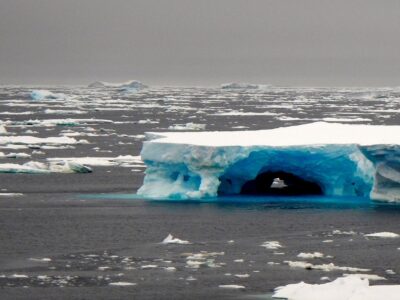
We humans have tried to dominate this planet and the earth has served as the basis for the material wealth enjoyed by many in the developed world. As our population has grown dramatically over the past hundred years, the planet’s ability to handle all of our needs has come under stress. I firmly believe that with ingenuity, technology, management and care, we can develop a renewable resource-based economy that can provide for all of us without destroying the planet. But a sustainable economy requires that we recognize our impact on the planet and learn to manage that impact. That requires science, engineering, management and a willingness to deal with reality.
Denying that humans cause climate change is a problem because climate is actually one of the more straightforward environmental impacts that we have identified. We know what causes greenhouse gas emissions and how to reduce them. By transitioning from fossil fuels to other forms of energy we can reduce human-made climate change. Changing the energy base of our economy will be a long and difficult process, but it is not particularly complicated.
Other problems—such as preserving biodiversity, the accumulation of marine debris, deforestation, and the release of toxics into our air, land, and water—are far more complex. The chemicals we have fabricated make our buildings more durable, our autos more efficient, and bring enormous benefit, but the flip side of their durability is that they are not biodegradable. They persist in the environment and must be managed to prevent harm. Some are toxic, others are simply persistent and end up where they don’t belong. We need to learn how to address the problems we understand before we get on to some of the more complicated problems that we are still trying to assess. We have to do a better job of recognizing the signs of environmental stress all around us. We know how to do this and have successfully grown our economy while reducing environmental impact. America’s air, water, and land are far cleaner today than in 1980. We have accomplished many environmental goals while continuing to grow our population and GDP. But we need to continue building our ability to protect the planet. Unfortunately climate change has become an ideological issue in the U.S. at the very moment we need to develop a consensus about the facts of human impact on our ecosystems.

We need to do a better job of building consensus on the facts of our impact on the planet. Let’s agree that population has grown. The world had 1.6 billion people in 1900, 2.5 billion in 1950, 6 billion in 2000 and 7.5 billion in 2017. The U.S. doubled in population from 1900 to 1950, growing from 75 to 151 million people during that half century. By 2000 we had 281 million people in the U.S. and this year we estimate our population at 326 million. Our use of energy and material resources has grown and in the developing world an era of rapid growth is now underway. We know that as people get wealthier, the rate of population growth slows and we expect the planet’s human population to peak at between 9 and 10 billion people, assuming that economic development takes place throughout the world.
The world’s population has grown by well over 400 percent since 1900. Our growing wealth and consumption has been even more dramatic, so here’s the obvious question: Could that amount of growth have taken place without significant negative impact on the planet’s air, water, and land? The technology that our economy is built on is far more toxic than we want to believe. That does not mean we can or should turn off the economy, but we must learn to understand its environmental impact. The fact of environmental damage is obvious and needs to be accepted. But more than that, we need to learn how to measure our impacts and minimize them when possible. I am not arguing that we need to change our way of life, but we need to pay more attention to what we are doing and do it with the least possible impact.
I believe that most climate deniers refuse to see the facts of human impact for one of two reasons: 1.) They do not want to change their lifestyle and resent being told they have to do so; or 2.) They have a vested economic interest in fossil fuels. I believe it is possible to maintain our lifestyles while reducing environmental damage, but the long term economic future for fossil fuels is not good. Energy use will continue to grow, since it is central to modern life. But fossil fuels are going the way of the horse-drawn carriage—useful during its time, but eventually displaced by better technology. The fossil fuel companies should become energy companies and get into the renewable energy business. Other businesses have managed to change with the times. The second “T” in AT&T stood for “telegraph.” The phone company got out of the telegraph business, and into the cell phone business. They recognized that the technology of communication was changing. The technology of energy is changing too. No amount of lobbying is going to change that.
Which brings me to climate change. The data is clear that the planet is getting warmer. While we can survive on a warmer planet, the impact of climate change on extreme weather events, agriculture, water, infrastructure, and other elements of the built environment will be profound and disruptive. Moreover, because there are more people on the planet, more people are in the pathways of climate impacts. This past weekend we saw Hurricane Harvey make landfall in Texas. The impact was devastating and is continuing. The storm was made intense by the warmth of the Gulf of Mexico, and the growing population of Texas placed many people in the path of the storm. These impacts and the destruction we are seeing are the new normal. We need to mitigate climate change to reduce the probability that things could get worse. We also need to do a better job of funding and managing recovery, a point I made in the Huffington Post three years ago.
Climate change is a test of our ability to identify, understand and act on critical global environmental issues. It tests our ability to work across national borders and across academic and professional fields of knowledge. Climate change affects food production, global production supply chains, extreme weather events, water supply and many other elements of the complex network of resources and institutions that make our lifestyles possible. We know many of the steps we need to take to mitigate climate change, but the impact of those steps on economic and political life are less well understood. We need to make the transition to a renewable resource-based economy in a way that facilitates rather than impedes economic growth. Any other method could result in political instability with unpredictable outcomes. The transition will be long and difficult.
Denying the existence of a problem makes it impossible to address that problem. It is clear that the Trump Administration does not accept the facts of climate change, and does not think much about the global challenges of environmental sustainability. Over the short term, progress will come despite their lack of interest. It will come because most of the world’s business and political leaders recognize the problem. They certainly have come to understand climate change.
The great advance in Paris was that 195 nations signed the climate agreement. Only Syria, Nicaragua and now the United States have refused to sign. The danger of global climate change and the science that explains that change is understood and accepted by nearly everyone. This has happened before, but is rare. Over a half century ago scientists taught us about the dangers of radioactivity from nuclear testing and in an effort to mitigate this early global environmental problem the U.S., U.S.S.R., and Great Britain signed a nuclear test ban treaty. In the past half-century we have learned about other global environmental threats and have struggled to address them. Climate change matters, because it may demonstrate our ability to identify, learn about, and act on a threat to the global environment that is deeply embedded in our economic life. We are still taking the test, but I believe we have a chance of passing.




It’s obvious that people inhabiting an area cause the temperature to rise. Take Pittsburgh, PA… a great example because it used to have the worst air pollution imaginable.
In 1946, the people of Pittsburgh started a concerted effort to clean it up and, combined with other historical circumstances, reduced the air pollution significantly within the following decades. Study the historical temperature data (e.g. https://www.weather.gov/pbz/pit_records) and you’ll see that the temperatures went down over the next 20-year period accordingly.
Also, looking at Pittsburgh’s population, you’ll see that it has reduced to only 50% of the population it was in 1946. And, over that time, the average temperature dropped by about 1.3 degrees Fahrenheit.
Obviously, it’s possible for a large group of people to increase the temperature of their environment. And since the global temperature is simply the sum of all the local temperatures on the planet, the global average temperature is rising. To deny this is just simply to be stubborn.
Now, with that being said…
Why is this global temperature change a problem? I have found no real answer to this question, just a lot of hyperbole.
This article only gives one example: a recent hurricane in Texas made mysteriously “worse” by the warmer air. Well, the worst hurricane Texas ever had was in the year 1900, when the global average temperature was about a degree cooler. So I’m not sure what the example of Hurricane Harvey proves. Currently, there are many predictions that the warmer air will cause more frequent severe storms, but so far the science is uncertain.
The only other real example has been that warmer weather causes increased flooding. The best evidence of this has come from the US 2017 Climate Science Special Report, and all they conclude is that the incidents of flooding have increased in some parts of the US and decreased in others. Not particularly convincing.
Just saying: If you want people to think that climate change is something they need to care about, you need to actually show why it’s a problem, not simply wag your finger at people while spouting doomsday predictions.
Humans DON’T ’cause’ climate change. ONLY Earth’s orbit around, and relative its positioning to, the Sun, as well as it’s tilt on it’s axis, plus solar activity, ’causes’ climate change. Nature, in the past, has managed to ’cause’ short-term climate change, via massive volcanic eruptions. Even then, the ‘change’ only lasted 2-5 years.
Failing to recognize that CO2 has no significant effect on climate is a distressing mistake but is dwarfed by the potential disasters of ignoring what is happening that actually does.
The still-rising water vapor (WV) is rising more than twice as fast as expected from water temperature increase alone (feedback). The rising WV coincides with rising irrigation, especially spray irrigation on fields and lawns. The warming (WV is a ghg) is welcome (countering the average global cooling which would otherwise be occurring as a result of declining net effect of ocean surface temperature cycles and a declining proxy which is the time-integral of SSN anomalies) but the added WV increases the risk of precipitation related flooding. How much of recent flooding (with incidences reported world wide) is simply bad luck in the randomness of weather and how much is because of the ‘thumb on the scale’ of added water vapor?